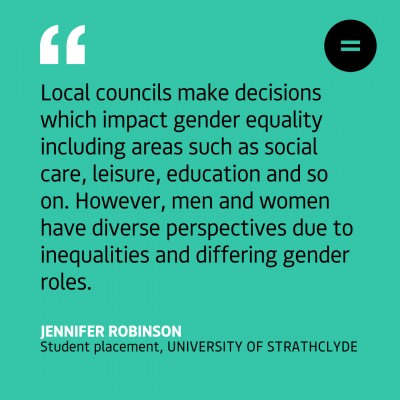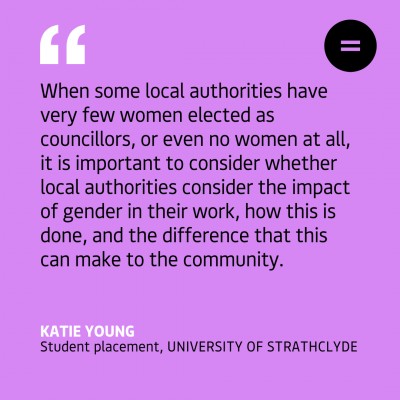Engender blog
All of Engender’s latest news. Reports, reviews, books, articles, and information from across Scotland’s women’s sector.
We would love to hear from other feminists around Scotland. Check out our guidelines for more information on how you can blog for us.
Tackling sexual and sexist harassment in the workplace
Engender is working to explore how we can prevent sexual and sexist harassment in the workplace and improve outcomes for victim-survivors as part of a project funded by grant-making charity Rosa. Here, our Policy Officer Mariah Kelly gives an overview of the scale of the issue and the work of the project:
GUEST POST: Racism - We reject #NotAll, We demand #NotAtAll
The (much delayed) report from the UK Government’s Commission on Race and Ethnic Disparities (CRED) was released last week, and claimed that many of the racial disparities found in the UK do not have their origins in racism. The report was met with incredulity by people and organisations who witness the myriad ways in which racism and white supremacy still impact on all areas of our politics, economy and society. This guest blog from Dr Shridevi Gopi-Firth explores and rejects the idea presented in the report that because ‘not all’ people are racist, institutional racism cannot exist.
Dr Shridevi Gopi-Firth is a Speciality Doctor in Eating Disorders for NHS Scotland, a ChoosePsychiatry 2020 representative, and Board Director of @Saheliya. She has been invited as BAME expert and peer reviewer for various guidelines and organisations including the upcoming Scottish IGN guidelines for Eating Disorders. Follow her on Twitter @Tychitha.

Nearly every healing or therapy starts with acknowledging your illness. Why is it that we as a society are unable to stand up and say ‘yes, the illness of racism exists’? Why does the Government need to come up with whitewashed reports like the CRED in this day and age to convince the public that racism is a thing of the past? It feels like an insult to our collective intelligence, while we BAME people continue to face so many instances of different levels of racism in our day to day lives.
GUEST POST: Experiences of the pandemic for women with a disability
Engender is currently hosting a survey developed with People First (Scotland), collecting responses from women with a disability about their experiences during the Covid-19 pandemic. In this blog, members of People First (Scotland) discuss the work they do, and share some of the experiences and issues that have been highlighted so far in the survey responses.
-400.png)
People First (Scotland) is a member-led Collective Advocacy organisation which supports people who identify themselves as having a Learning Disability. We work all over Scotland and the organisation is part of a wider international movement. A group of women within the membership of People First were asked to participate in the creation of a survey about the experience of women and their access to health and social care services during the pandemic. This blog post details some of their responses and captures their views in relation to this topic.
People with a Learning Disability are often marginalised and forgotten about in society and this has never been truer than our experience as women throughout the coronavirus pandemic. We had so little information when the pandemic started, no one told us what to do and there were no easy read versions of the restrictions to help us understand. For lots of people, services and support stopped completely. Some of us felt scared, alone and definitely forgotten about. This experience continues even now.
GUEST POST: Gender representation within Local Authorities
Today we're publishing the second in a series of blogs from two student placements Engender is hosting from the University of Strathclyde Applied Gender Studies and Research Methods course. These blogs explore women's representation and decision-making around women's equality in local authorities across Scotland. You can see other blogs in the series here.
In 2020 Jennifer Robinson graduated with an honours degree in Society Politics and Policy from the University of the West of Scotland. She is now undertaking a Masters in Applied Gender Studies and Research Methods with a particular interest in feminist disability studies. She has previously written for the Glasgow Women’s Library and you can find her tweeting about feminism and disability on twitter @JenRobinson95.

I never imagined that I would be studying for a Master’s degree from the comfort of my own home in Paisley. One perk is being wrapped in a big cosy blanket and pouring myself endless cups of tea while I read about various feminist topics. I am also excited to be undertaking a placement with Engender as part of my degree.
The placement aims to build upon Engender’s Sex & Power report 2020 which showed an overrepresentation of men in positions of power. Particularly, the report found that women made up only 29% of elected councillors at the local authority level. Local councils make decisions which impact gender equality including areas such as social care, leisure, education and so on. However, men and women have diverse perspectives due to inequalities and differing gender roles. Therefore, if councils are dominated by men, they cannot provide diverse representation for their residents. The placement will include a gender audit of representation in local authorities and their policy areas. I will be investigating representation and policy within Renfrewshire Council (my own local authority) and Edinburgh council and documenting my findings through a series of blogs.
Firstly, I wanted to count the number of councillors who were women within Renfrewshire and Edinburgh and compare this to the numbers from the previous council election which took place in 2017. I then looked at the numbers of women in each party and each ward today. Gathering these numbers illustrates the lack of women’s representation within each local. I have broken down these numbers in the following sections.
GUEST POST: Women and decision-making in local authorities
Today we're publishing the first in a series of blogs from two student placements Engender is hosting from the University of Strathclyde Applied Gender Studies and Research Methods course. These blogs explore women's representation and decision-making around women's equality in local authorities across Scotland. You can see other blogs in the series here.
Katie Young graduated from the University of Glasgow with a degree in English Literature in Summer 2020, and is now studying a Master’s degree in Applied Gender Studies and Research Methods at the University of Strathclyde. She is passionate about women’s fiction and empowering girls and young women to fight for gender equality in Scotland through volunteering with Girlguiding, and tweets under @katieeey.

Building on Engender’s most recent Sex and Power report, which found that women made up only 23% of local councillors despite accounting for 52% of Scotland’s population, my project focuses on the work of local authorities, how we can best achieve gender equality, and what might need to change to ensure that we get there. When some local authorities have very few women elected as councillors, or even no women at all, it is important to consider whether local authorities consider the impact of gender in their work, how this is done, and the difference that this can make to the community.
In undertaking this project, I chose to focus in two neighbouring local authorities, West Dunbartonshire and Argyll and Bute, due to their difference in size and population spread. As one of the smallest local authorities in Scotland, West Dunbartonshire covers Clydebank and Dumbarton, and its council is lead by a coalition of SNP and Independent councillors. Both council leaders are men and there is at least one woman holding a seat on all but one of the individual wards, with women making up six of the twenty two positions, which is 27% of elected councillors overall. The SNP has the most women of all parties represented on the council, with four of its six members. This is followed by Scottish Labour, where there is one woman and seven men represented on the council, and the Scottish Conservative and Unionist party, the only party to have a balanced representation, which has one man and one woman holding elected roles. The other groups represented on the council, the West Dunbartonshire Community Party and Independent officials, are both only represented by men.
Argyll and Bute is the second-largest local authority in Scotland by geographical area, and covers areas in mainland Scotland and some islands including Bute, the Isle of Mull and Iona, and Islay. The council is lead by a coalition of Independent, Liberal Democrat, and Scottish Conservative and Unionist party councillors, and like West Dunbartonshire, both council leaders are men. Women hold ten of the thirty six elected positions on the council, 29% overall, and three of the eleven individual wards do not have any women elected. Similarly, the SNP have the most women represented on the council, with four women holding their eleven elected seats, followed by the Scottish Conservative and Unionist party, which has two women and seven men on the council, and the Liberal Democrats, with one woman and four men having been elected. Women account for three of the eight Independent councillors and the Independence for Scotland party only have one man represented on the council.
Both councils are slightly above the average in the Sex and Power research, although have some way to go in ensuring gender equality. Here, women still holding comparatively fewer seats on the council than men, and only the Scottish Conservative and Unionist party in West Dunbartonshire having equal representation in their elected representatives.
More broadly, I’m interested in researching the way that both councils carry out Equality Impact Assessments, which considers the impacts that decisions may have on the lives of women and people with other protected characteristics. This supports the Inter-Parliamentary Union’s toolkit for creating a ‘gender sensitive parliament’, which is one that creates a that responds to the needs of men and women equally in its structures both internally and externally as well as in its work on a day to day basis, as it works on embedding and mainstreaming gender equality throughout its work. Both West Dunbartonshire and Argyll and Bute publish some information on how this relates to specific policies and areas of the council’s work, but this is not consistent. I’m interested in exploring the common areas that both local authorities identify, and where differences may exist. For example, this may be that one local authority publishes its guidance for carrying out these assessments, but one does not. By including women at all stages of the decision making process and considering the impact that these decisions may have, we are one step closer to ensuring gender equality in the future.
Downloads
 Engender Briefing: Pension Credit Entitlement Changes
From 15 May 2019, new changes will be introduced which will require couples where one partner has reached state pension age and one has not (‘mixed age couples’) to claim universal credit (UC) instead of Pension Credit.
Engender Briefing: Pension Credit Entitlement Changes
From 15 May 2019, new changes will be introduced which will require couples where one partner has reached state pension age and one has not (‘mixed age couples’) to claim universal credit (UC) instead of Pension Credit.
 Engender Parliamentary Briefing: Condemnation of Misogyny, Racism, Harassment and Sexism
Engender welcomes this Scottish Parliament Debate on Condemnation of Misogyny, Racism, Harassment and Sexism and the opportunity to raise awareness of the ways in which women in Scotland’s inequality contributes to gender-based violence.
Engender Parliamentary Briefing: Condemnation of Misogyny, Racism, Harassment and Sexism
Engender welcomes this Scottish Parliament Debate on Condemnation of Misogyny, Racism, Harassment and Sexism and the opportunity to raise awareness of the ways in which women in Scotland’s inequality contributes to gender-based violence.
 Gender Matters in Social Security: Individual Payments of Universal Credit
A paper calling on the Scottish Government to automatically split payments of Universal Credit between couples, once this power is devolved to the Scottish Parliament.
Gender Matters in Social Security: Individual Payments of Universal Credit
A paper calling on the Scottish Government to automatically split payments of Universal Credit between couples, once this power is devolved to the Scottish Parliament.
 Gender Matters Manifesto: Twenty for 2016
This manifesto sets out measures that, with political will, can be taken over the next parliamentary term in pursuit of these goals.
Gender Matters Manifesto: Twenty for 2016
This manifesto sets out measures that, with political will, can be taken over the next parliamentary term in pursuit of these goals.
 Scottish NGO Briefing for UN Special Rapporteur on Violence Against Women
Joint briefing paper for the UN Rapporteur on Violence Against Women.
Scottish NGO Briefing for UN Special Rapporteur on Violence Against Women
Joint briefing paper for the UN Rapporteur on Violence Against Women.

Newsletter
Sign up to receive our newsletter here:
Sign up to our mailing list
Receive key feminist updates direct to your inbox: